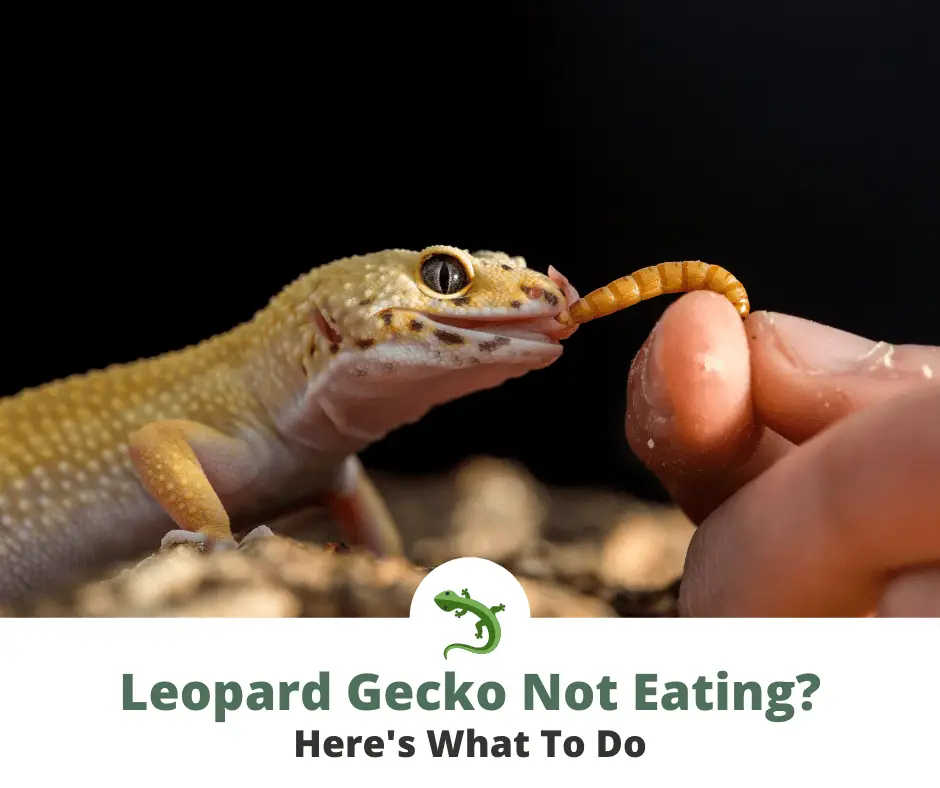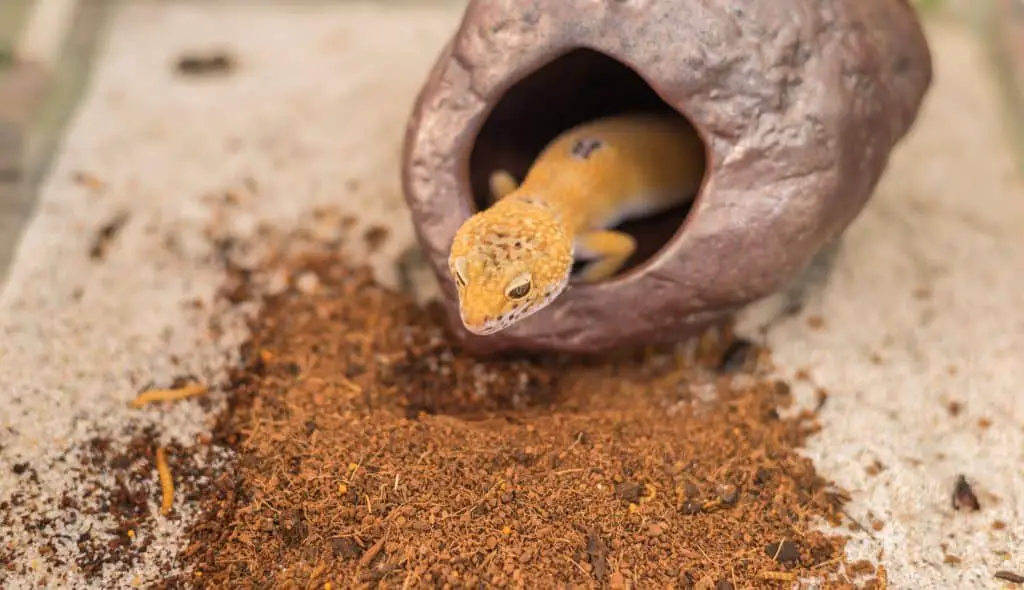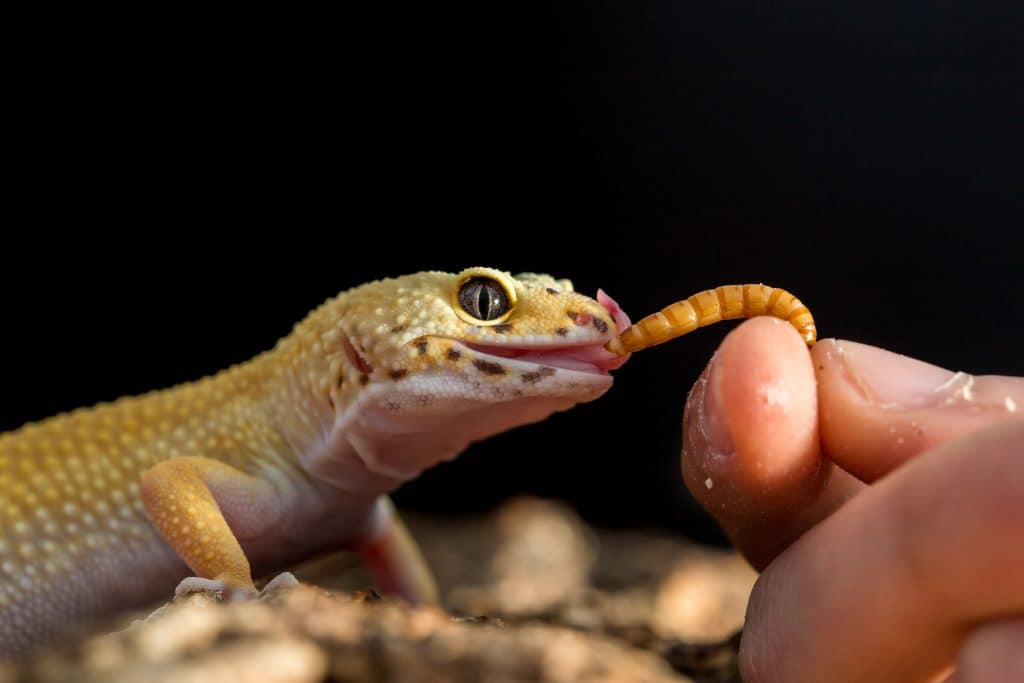Having problems getting your Leopard Gecko to eat? The most common reason is that they’re too cold, but there are other factors you should consider.
In this guide, you’ll learn:
- Common reasons Leopard Geckos stop eating
- How can you get them to eat again?
- Should you see a Vet?

Leopard geckos are insectivores that hunt various insects in the wild for food. In captivity, they feed on small locusts, crickets, silkworms, mealworms, waxworms, superworms, grasshoppers, springtails, and even pinkie or nestling mice.
Reptiles can stop eating for a variety of reasons, some of which are serious and some that can be easily addressed at home.
Pro-tip
It’s important to note that most of these causes can be prevented by maintaining the proper conditions in your pet’s enclosure starting with temperature and lighting. Temperature and lighting have a big effect on the digestive systems of reptiles and their overall health.
Why Do Leopard Geckos Stop Eating?
The most common reason we see that cause Leopard Geckos to stop eating is because they’re enclosure is too cold.
Poor lighting and temperature
Temperature and lighting are environmental factors that have a significant effect on the digestive system and metabolism of reptiles. If it gets too cold, their metabolism will slow down which makes it harder for them to digest their food, causing them to lose their appetite.
Leopard geckos are unlike most pet reptiles because they like getting heat through their bellies by laying on top of rocks that have been heated by the sun. This is why an under-tank heater or a heat mat is best for geckos or a setup wherein a heat lamp can heat up a rock that your gecko can lay on to help warm itself up. A ceramic heat emitter (CHE) lamp is also useful to provide heat at night.
Pro-tip
If you use lamps with bulbs to heat your enclosure, always have a spare bulb handy. We recommend always buying an extra each time you purchase bulbs.
The temperature on the hotter part of the tank should be 75-88°F over the mat or on the rock and 70-75°F at the cooler end. Temperatures at night should not drop below 68-70°F. Invest in a quality thermometer to make sure you are monitoring your temperature levels accurately.
Impaction
An impaction can also affect your gecko’s appetite. This can be in a form of a digestive tract impaction or a fecal impaction.
Particles or foreign objects (like loose substrate), when accidentally ingested, can become stuck in your gecko’s digestive system causing impaction. This can lead to loss of appetite. With proper hydration, the impaction can pass but serious cases often require surgery.
Fecal impaction can also occur due to a meal that was not digested properly or accidental ingestion of a foreign object. Urate plugs can also cause fecal impaction. Try a lukewarm soak in a shallow water dish while gently massaging your gecko’s belly. This can help pass the feces or clear the urates.
If the bath does not work then you might need to take your gecko to the vet so he can check for other health issues such as parasites. Prevent digestion problems with proper heating and lighting.

Preparing for brumation, shedding, or the breeding season
- The ambient temperature is signaling them to brumate
If the ambient temperature gets too cold (e.g. below 70-75°F) then it can signal brumation in your Leopard gecko. This usually happens around December to February when the season gets colder. At this time, the metabolism of your gecko will slow down to prepare it for brumation causing a decrease in appetite.
- They are preparing for shedding
Geckos will also eat less as they prepare for shedding. Two days before they actually shed you may notice your Leopard gecko spending more time in their hides and refusing to eat. They may not immediately eat after shedding as well. If your gecko is having shedding trouble or refuses to eat three days after completing its shed then you may need to take it to the vet.
📚 Read More >> Leopard Gecko Shedding Guide
- It’s the breeding season
If you have a female Leopard gecko then it may be undergoing ovulation and/or is already gravid which can cause some loss of appetite. At this time, make sure your female gecko is getting enough nutrition especially calcium supplements. You may also notice your female hiding more often as it prepares to nest and lay its eggs. As the female gecko lays its eggs it will probably lose some weight.
Male Leopard geckos can also refuse to eat during breeding season as they prepare to mate with females.
During the breeding season, your geckos will probably lose some weight but if you notice that they lost a lot of weight over a short period then you should probably take them to a vet.
Underlying health issues
Loss of appetite is a co-occurring symptom of various health issues that can affect your Leopard gecko. Your gecko can often lose its appetite and become lethargic because of another illness that is weakening it.
📚 Read More >> Leopard Gecko Mouth Rot
Common health issues that can affect your Leo are:
- Shedding or dysecdysis
Shedding problems or dysecdysis occurs when old skin dries up around the limbs, toes, and even eyes of your Leopard gecko causing constriction and infections. Shedding in itself is already a demanding time and with issues, it can be hard for your gecko’s health. Make sure your gecko is well hydrated by providing it a shallow water dish or an occasional bath. If it has an incomplete shed, a lukewarm bath and very very gently teasing out the old skin loose with a q-tip or a cotton bud may help.
- Respiratory infections
Respiratory issues are common health problems for reptiles due to infections or poor husbandry. Make sure your gecko’s enclosure maintains the correct humidity levels and is kept clean to help prevent any infections that can cause a respiratory problem. These can cause your Leopard gecko to lose its appetite and become lethargic.
- Injury
An injury from a fight (if your gecko is in a community tank) or an accident from the tank furniture can cause loss of appetite as your gecko recovers. Make sure your gecko’s cage furniture is arranged to prevent any accidents and provide multiple hides to prevent territory issues with its tank mates. Keep in mind that Leopard geckos and most reptiles prefer to be alone in their enclosures.
- Parasitic infection
Parasites such as pinworms and Cryptosporidium saurophilum can affect the digestive tract of Leopard geckos causing diarrhea, rapid weight loss, decreased growth, and loss of appetite. These infections can rapidly progress so make sure you observe your gecko at the first sign of any of these symptoms and make a trip to the vet to be sure. Pinworms can be hard to detect in their stool even at high levels.
- Metabolic Bone Disease
Metabolic bone disease (MBD) due to lack of calcium and vitamin D3 can affect your Leopard gecko’s jaws making it painful for them to eat. Make sure your gecko gets enough nutritional supplements to prevent MBD.
Though Leopard geckos do not require UVB lighting, low-level UVB lamps are shown to be beneficial to their health. If you opt not to provide them with UV lighting, make sure you give them supplements. Proper heating will also ensure that these nutrients are absorbed properly.
Important
Most articles suggest that Leopard geckos do not necessarily need UVB lighting but benefit in terms of health when provided with it. The health benefits of UVB lighting for Leopard geckos were confirmed in a recent 2020 study on vitamin D3 synthesis in Leopard geckos. They found that a Leopard gecko synthesizes vitamin D3 when exposed to UVB light. Low UVB level (UVI ≤ 1.6) exposure for 2 hours daily increased the vitamin D3 levels in their blood by 50%.
- Egg binding
If your female Leopard gecko fails to lay their eggs it can become stuck in their bodies. This is often due to the lack of a nesting site or oviduct contraction difficulty due to calcium deficiency. Lethargy, lack of appetite, excessive digging, straining, or a distended coelom are usual symptoms. Oral or intramuscular calcium supplements are the usual treatments. In severe cases, surgical removal is advised.
- Tail Autotomy
Leopard geckos will self amputate their tail when threatened. As the tail is lost, regrowing it can use up your gecko’s energy and reserves that can cause it to become lethargic and lose its interest in food.
If this happens, move your gecko to another tank lined with a paper towel to keep the wound clean (or clear its cage for any furniture that can cause further injury). You should isolate your gecko until the tail has regenerated. Feed it daily (but avoid crickets) to prevent tissue damage. The tail should regrow after 5-8 weeks.
📚 Read More >> Leopard Gecko Tail Rot
- Hemipene infections
Male Leopard geckos can develop infections on their hemipenes due to vitamin A deficiency, poor hygiene, and trauma from non-receptive females. Their hemipenes can become swollen (near the tail base) and develop an abscess causing loss of appetite and lethargy. Treatment involves antibiotic therapy and possible removal of the affected tissue under anesthesia.
Environmental or enclosure issues
- Bullying
If your Leopard gecko is housed with another gecko then it may be being bullied. Leopard geckos are solitary animals. They may be able to tolerate being housed with another gecko if they are both females or a male in a group of females as long as multiple hides are available and the tank is big enough. However, if there is a gecko significantly bigger than the rest then it may bully the others which can cause stress and injury that eventually leads to feeding issues.
- New environment
Reptiles can be quite sensitive about changes in their environment. You may notice your gecko excessively hiding and refusing to eat after you thoroughly clean its enclosure. This is normal behavior as your lizard gets used to its new surroundings again.
Other possible causes for not eating
Your gecko may be going through “puberty” as it sexually matures (after about a year) causing significant changes in its system that can cause it to lose interest in food.
Stress can also be a cause of loss of appetite. Stress can come from multiple sources including any of the illnesses listed above. It can also come from excessive handling. So if you notice your gecko is hiding and refusing food after handling it for a while then you should probably lessen interaction with it.
There is also such a thing as picky eaters amongst reptiles so you may have to try other types of feed to get your gecko to eat better.
📚 Read More >> Can Leopard Geckos Have Fruit?
What Can You Do To Get Your Leopard Gecko To Eat?
- Provide the proper tank conditions (heating and lighting)
The best way to address the loss of appetite would be to provide the proper heating and lighting in your Leopard gecko’s enclosure to ensure proper metabolism and digestion.
- Change their diet
Leopard geckos are by nature, hunters, so they usually eat moving insects. If their feed does not move too much, they may not immediately recognize it as food and fail to eat it. They may also be picky eaters so changing their diet to other feeder insects could get them interested in their food as well. Make sure you gut load or dust the insects before feeding them to your gecko to provide proper nourishment.

Make sure your Leopard gecko’s diet is varied as well. Worms such as mealworms and superworms can be high in fat and can be tough to digest causing issues or even impaction so make sure you feed them with these food types sparingly.
- Eliminate any stressors and check their health
As mentioned, loss of appetite is a common symptom of many underlying issues or stressors. Make sure everything is in order in terms of husbandry and that nothing is affecting your Leopard gecko, health-wise. If you have a gecko housed with others then it may be stressed out by the living situation so you may need to reconsider.
If your gecko is rapidly losing weight as well then you need to schedule a visit to the vet.
When Should You See A Vet?
If you notice other health conditions such as lethargy, excessive hiding, and signs of infections in addition to the loss of appetite then you may need to see the vet. If your gecko doesn’t eat for a while (3-4 days straight) then you should also visit the vet. If your gecko loses a lot of weight in a short period then you should definitely get it checked by a specialist as well.
Conclusion
Loss of appetite can be caused by different reasons. The best way to prevent this would be to ensure that proper conditions, especially with regards to heating and lighting, are met. Heating plays a big part in your gecko’s digestion and metabolism so make sure their tank is not too cold. However, loss of appetite can be a symptom of other health conditions so be sure to check for these, especially if it’s accompanied by rapid weight loss.
FAQs
How long can leopard geckos go without eating?
Leopard geckos can go without eating for up to two weeks at a time especially during shedding and brumation. They can live off the fat reserves on their thick tails. However, if this causes rapid weight loss then it may be a symptom of other health issues such as a parasite infection or an impaction.
Will a leopard gecko starve itself?
A Leopard gecko will not intentionally starve itself outside of shedding or brumation season. There may be other health issues that are causing your gecko to lose its appetite such as a parasitic infection, impaction, or digestion issues due to poor heating and lighting.
Further reading
Overview on Leopard geckos:
ADW: Eublepharis macularius: INFORMATION
Management and care of Leopard geckos:
MANAGEMENT, CARE, AND COMMON CONDITIONS OF LEOPARD GECKOS
A detailed study on Leopard geckos:
Natural history and biology of hobbyist choice leopard gecko Eublepharis macularius
Short article on care:
Leopard Gecko Husbandry and Nutrition


